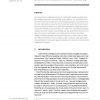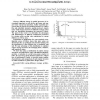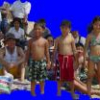981 search results - page 110 / 197 » Negation in Spatial Reasoning |
PRESENCE
1998
13 years 10 months ago
1998
Two experiments investigated components of participants’ spatial knowledge when they navigated large-scale ‘‘virtual buildings’’ using ‘‘desk-top’’ (i.e., nonimm...
ICASSP
2010
IEEE
13 years 9 months ago
2010
IEEE
Bag-of-visual Words (BoW) image representation is getting popular in computer vision and multimedia communities. However, experiments show that the traditional BoW representation ...
ICRA
2010
IEEE
13 years 9 months ago
2010
IEEE
Multi-robot systems researchers have been investigating adaptive coordination methods for improving spatial coordination in teams. Such methods adapt the coordination method to th...
FPL
2010
Springer
13 years 9 months ago
2010
Springer
Abstract--Efficient storage in spatial processors is increasingly important as such devices get larger and support more concurrent operations. Unlike sequential processors that rel...
ICCV
2007
IEEE
15 years 1 months ago
2007
IEEE
Occlusion reasoning, necessary for tasks such as navigation and object search, is an important aspect of everyday life and a fundamental problem in computer vision. We believe tha...



